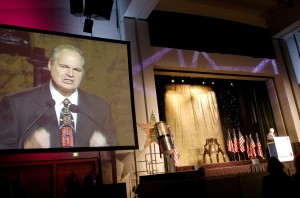The Enemy is Bullshit
“President Obama himself has engaged in class warfare trying to separate Americans”.
“[The Democrats are] running campaigns against the American people”.
These two quotes, the latest to make political news from Texan Senator John Cornyn, illustrate the way that complex issues and policies are rolled into generalized, offensive statements. The political process in the United States today is largely made up of these simple sound bites that distract the viewer from the nature of the issues at hand—they are intended to provoke a visceral reaction, not an informed opinion. Especially during election season, these strategies distract voters from the actual content of political platforms. Senator Cornyn clearly wanted to make news and, however idiotic his comments may have been, someone was there to report them.

The age of the 24-hour news networks and Twitter updates has come with both pros and cons. It allows people to access and to stay informed of national and international events in real time. Yet the resulting need to continuously have material worthy of reporting tends to encourage a cycle of divisive quotes and “he said, she said” banter. This type of news reporting is not conducive to thoughtful, well-researched programming but in fact detracts from the quality of the reporting itself. Take these extreme quotes of the last political year for example: “Obama’s got a health care logo that’s right out of Adolf Hitler’s playbook … Adolf Hitler, like Barack Obama, also ruled by dictate,” and “I don’t know how anyone of Hispanic heritage could be a Republican, okay. Do I need to say more?”
The first quote came from right wing political commentator Rush Limbaugh, and the second from Senate Majority Leader Harry Reid. These quotes both capitalize on invoking strong emotional reactions in the public. The first one talks about the issue of healthcare, comparing nationalizing healthcare with Nazi propaganda. Obviously this notion is absurd, yet was reported because it is a short snippet that both makes headlines and gets people talking. The same can be said of Harry Reid’s quote about Hispanics in the Republican Party. He is generalizing both an entire people and an entire party support base into the narrow scope of his rigid views.
Emotions, though effective in garnering support for a cause, tend to undervalue and ignore rational thought and dialogue in promotion of that same cause. As such, it is very easy to get sidetracked from a political discussion into a screaming match if rationality is downplayed in this manner. Yet these sort of screaming matches have somehow become uncomfortably common in the 24-hour news cycle. After all, they are profit-driven organizations and the easiest way to get ratings and entertaining viewers is by reporting these wild, outlandish quotes.
So why is this obviously profits-first policy tolerated in such an important political sphere? It is because people have voted with their viewership that it is acceptable behavior for newscasters to essentialize major issues into a “yes” or “no,” black or white position and thereby emphasizing the extremes of the political spectrum.. For example, the issue of abortion cannot adequately be summarized into “pro life” and “pro choice,” stances , even though it is often portrayed this way. We hear only of those who have murdered doctors who perform abortions, or about those who use abortion as flippantly as contraception and thus everything in between is decided unimportant.
There are steps we can all take to improve the mindless status quo of the snippets of passionate firebrands. When engaging someone in a discussion on issues that touch our core values and beliefs, we must try to remember that the world is not nearly as simple as we would like it to be; issues are not a matter of yes or no, but are almost always made up of many maybes. For the sake of the American political system, one can hope for a realization from candidates and reporters alike that the current political discourse is preventing us from ultimately improving the country. After all, one of the central ideas in creating a democratic government is to help improve the standing of the people that it governs. We must not forget that. In the words of Lars-Erik Nelson, a political columnist, “The enemy isn’t conservatism. The enemy isn’t liberalism. The enemy is bullshit.”